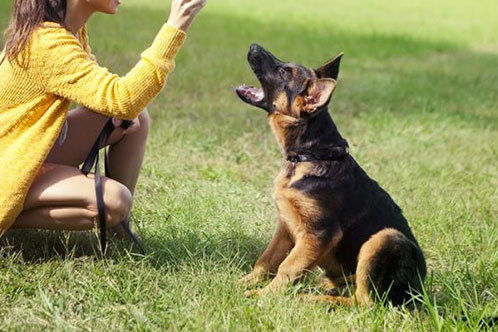Did you know that the German Shepherd is one of the most popular breeds to own? This big furry friend might be the canine that you have been looking for. You might also hear this canine referred to as an Alsatian. Either way, this is an intelligent, loving and loyal pup that can make your household complete.
Connect with a verified veterinarian in minutes. Licensed vets are available 24/7 to answer your questions. No need to worry about your furry family member.
You can expect the Long-Haired German Shepherd to reach up to 26 inches in height and weigh up to 95 pounds. This is going to depend on whether your pooch is a male or female. Of course, they will have long fur, which is typically black and tan, black or brown. When the Long-Haired German Shepherd is a puppy, they will have floppy ears. They have them until around 16 to 20 weeks old. This is then when the ears will start to stand up on their own. If your canine’s ears are not standing up, you can visit the veterinarian to see if there are any problems.
Do They Have a Good Temperament?
Unfortunately, there are some misconceptions when it comes to the temperament of the German Shepherd. This pooch is a loveable and loyal canine that is suitable as a family dog. They are good with children and they make a great guard dog. They are also very loyal to their owners and will love to spend time with you. While some people think that Long-Haired German Shepherds are big and scary dogs, most of the time, they are as playful and loving as kids!
Do They Need a lot of Grooming?
If you want to adopt the Long-Haired German Shepherd, you may think that they need a lot of grooming. Indeed, there is going to be some maintenance involved with their coat. However, it is interesting to realize that the Long-Haired German Shepherd actually sheds less than the short-haired. This is due to the fact that this canine does not have an undercoat. This means that you will not have to vacuum as much or complain about your furniture being covered in fur.
You will have to brush your Long-Haired German Shepherd’s coat a couple of times a week. This is going to make sure that the hair stays silky and smooth. It will also prevent knotting and tangling that can make your pooch feel uncomfortable. A bath once per month will also ensure your pup smells nice and is hygienic.

Review symptoms, medications & behavior to keep your pets healthy with a Vet Online in just minutes.
Ask a Vet Live NowDo They Need a lot of Exercise?
The Long-Haired German Shepherd is not a breed that you can just take for a quick spin around the block. This is a pooch that has a lot of exercise needs and energy that they need to expend in a healthy way. Therefore, know that your Long-Haired German Shepherd is a working dog and it is necessary to provide them with challenging exercise. If you are somebody that loves to go hiking, running or on a new outdoor adventure, the Long-Haired German Shepherd is going to be the perfect companion. In addition, they are going to love going to the park with a bag or frisbee to run around. Just make sure that your furry friend has good recall to ensure they can have fun in a safe way.
If you do not provide your Long-Haired German Shepherd with enough exercise, they may become destructive in the home. This can include chewing your possessions and furniture. They are also going to need mental stimulation so that they can use their brains. It is important to remember that Long-Haired German Shepherds are working dogs and like to be active and have a job. Therefore, they are going to love having puzzles and toys during the day. You can also have training sessions with them and this can make your pooch think. They will also love to receive a reward for their hard work.
Do They have Any Health Problems?
Every breed of dog has their weak points and the Long-Haired German Shepherd is no different. Unfortunately, this furry friend can be prone to hip dysplasia. This is something that can be passed down from adults to puppies during breeding, which means that it is a health condition to be aware of.
If your Long-Haired German Shepherd does have hip dysplasia, they are going to start limping on the hind legs. This will be quite obvious and difficult to ignore. They can also have trouble lying down comfortably, as well as struggling to get up. If you think that your beloved companion has hip dysplasia, you should visit the veterinarian. They are going to be able to carry out a physical examination and run blood tests, as well as x-rays. This will let you know if your canine has this condition.
Where Do I Find a Long-Haired German Shepherd?
If you would like to adopt a Long-Haired German Shepherd, head to your local animal shelter. There are always pups looking for homes and they can be socialized and have some training already. Indeed, you are likely to find German Shepherds at shelters. While you may have to research for the long-haired type, there are going to be some options available for you. This can be an affordable and rewarding way to expand your family.
There are also German Shepherd rescues and organizations available that you can contact. You can find canines looking for a forever home. You may have to travel and pay a fee. But this is still a great way to add a dog to your household. You can receive the breed that you want and give a dog a home at the same time.
The last option is to buy a Long-Haired German Shepherd pup from a breeder. The Long-Haired German Shepherd can have a high price tag. Just make sure that you always learn about breeders before deciding to buy a pup. You want to ensure that they look after their canines and that they are not a puppy mill. Always visit the premises and ask to see the parents first.
Connect with a verified veterinarian in minutes. Licensed vets are available 24/7 to answer your questions. No need to worry about your furry family member.

Julie
Julie is a graduate of the University of North Carolina, Wilmington, where she studied Animal science. Though contrary to the opinion of her parents she was meant to study pharmacy, but she was in love with animals especially cats. Julie currently works in an animal research institute (NGO) in California and loves spending quality time with her little cat. She has the passion for making research about animals, how they survive, their way of life among others and publishes it. Julie is also happily married with two kids.
Review symptoms, medications & behavior to keep your pets healthy with a Vet Online in just minutes.
Ask a Vet Live Now



